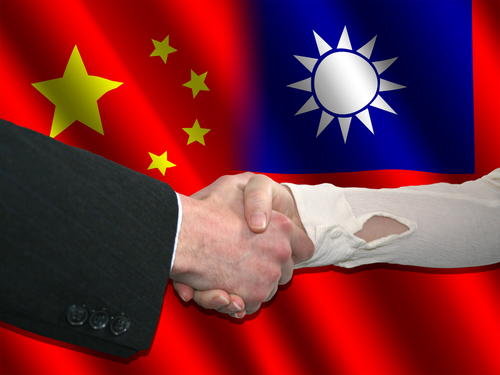Why Taiwan Needs Regional Integration

Please note that we are not authorised to provide any investment advice. The content on this page is for information purposes only.
Recent demonstrations in Taiwan against a trade deal with China reflect the public’s deep mistrust with the mainland. Yet Taiwan needs these trade deals to sustain its economy, not just with China, but with the rest of Asia.
Taiwan’s demonstrators occupied its legislature on March 18 to 24 to resist a new trade bill with the mainland. And yet, Taiwan needs regional economic integration to sustain its economy.
Recent demonstrations in Taiwan against a trade deal with China reflect the public’s deep mistrust with the mainland. Yet Taiwan needs these trade deals to sustain its economy, not just with China, but with the rest of Asia.
Taiwan’s demonstrators occupied its legislature on March 18 to 24 to resist a new trade bill with the mainland. And yet, Taiwan needs regional economic integration to sustain its economy.
In Taiwan, the ruling Kuomintang party and its leader, Ma Ying-jeou, support the pact that would lower barriers for Taiwan and the mainland to invest in each other’s service sectors.
But as KMT lawmaker Chang Ching-chung announced that the trade agreement should be sent to the legislative floor in its entirety, the opposition Democratic Progressive Party protested the decision and student groups stormed Taiwan’s legislative chambers. As students refused to leave, they were removed forcefully from the building.
The occupation was not spontaneous. Reportedly, it was “months in the making”.
In the West, the narrative has been framed as a “quest for democracy.” But if anti-trade groups occupied the US Congress or the White House with promises of escalation, it is fair to assume that the reaction would be far more forceful.
Could Taiwan thrive without these trade deals? Let’s review the facts.
Table of Contents
Building Integration With China
Until 2008, cross-Strait relations were characterized by six decades of limited contact and instability, and years of rising tensions. In 2008 the Kuomintang won the elections in Taiwan and gained majority in the Taiwan’s legislature.
Afterwards, “three links” – transportation, commerce and communications – were restored between the two sides.
In the summer of 2010, Taiwan and the mainland agreed on the Economic Cooperation Framework Agreement (EFCA). The preferential trade agreement reduced tariffs and commercial barriers between the two sides and boosted bilateral trade to $197 billion last year.
From the standpoint of bilateral trade, the Cross-Strait Service Trade Agreement (CSSTA) is a vital follow-up to the ECFA. It would open Taiwan’s industries to mainland investment, while the mainland would open industries to Taiwan’s investment.
Related: Taiwan President Seeks Deal With China To Boost Economy
Related: China, Taiwan To Hold First Official Talks Since Split
From Goods To Services
While the CSSTA is just one of many proposed trade agreements to the mainland, it is a critical lifeline to Taiwan.
First of all, the CSSTA would allow Taiwanese businesses to broaden and deepen their economic expansion in the mainland.
Also, the ECFA focuses on goods, while the CSSTA stresses services. Goods are important in the early stages of economic development, whereas services are vital in the more advanced stages of development. The CSSTA supports Taiwan’s efforts to move higher in the value-added chain, while boosting reforms that support the transition of the mainland economy from cost-efficiencies toward innovation-driven competitiveness.
Third, Taiwan’s economic growth relies critically on exports. As a result, the CSSTA is vital to protect Taiwan’s current sources of competitive advantage and to build new sources of advantage. Moreover, the pact does not include or support labor migration.
Finally, it also paves way for further economic integration with other nations in Asia, which is critical to Taiwan’s future.
From Globalization To Regionalization
After the worldwide crisis of 2008/9, global economic integration has slowed, but regional economic integration has intensified, especially efforts toward free trade agreements in Asia. In the past, Taiwan’s rapid growth relied on globalization. Today it must thrive with regionalization. After all, in 2012 the mainland and Hong Kong SAR accounted for more than 40 percent of all Taiwan’s exports. Without these export destinations, Taiwan’s export-led growth would collapse.
That same year, the United States and Japan accounted for 16 percent of Taiwan’s exports. But in both countries, recovery is sluggish, which translates to fragile demand. In the future, much of global growth will be driven by the mainland and emerging Asia.
The intensified regional integration is reflected by the ongoing talks over the US-led Trans-Pacific Partnership (TPP) and the Regional Comprehensive Economic Partnership (RCEP) which includes the mainland. Meanwhile, ASEAN integration is accelerating toward 2015. In addition to these regional trade blocs, talks continue over bilateral free trade and investment agreements between different economies in Asia and the US or European Union.
Related: China Opens Labour Market To Taiwan
Related: Taiwan To Allow Larger Chinese Stakes In Domestic Banks
Political Consensus To Support Economic Growth
Nonetheless, in Taiwan and elsewhere, economic success is challenging without adequate political consensus.
Conversely, political determination without sufficient economic growth will only result in stagnation.
What Taipei needs is a political consensus that supports an economic pro-growth path; and that requires trade pacts with the mainland and the rest of the emerging Asia.
By Dr. Dan Steinbock
Dr. Dan Steinbock is Research Director of International Business at the India, China and America Institute (USA) and a visiting fellow at the Shanghai Institutes for International Studies (China). For more, see www.differencegroup.net
The original version was published by China Daily on March 27, 2014
Get more special features in your inbox: Subscribe to our newsletter for alerts and daily updates.
Do you have a strong opinion on this article or on the economy? We want to hear from you! Tell us what you think by commenting below, or contribute your own op-ed piece at [email protected]




